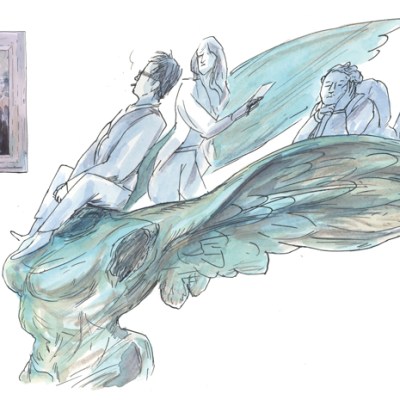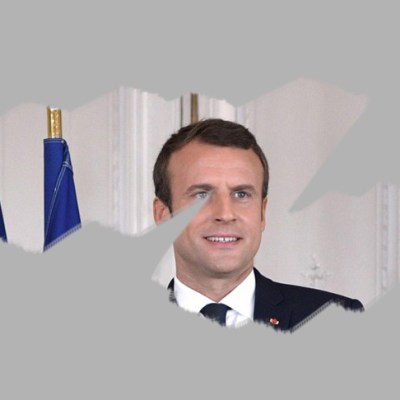The launch of the French culture pass – Emmanuel Macron’s flagship policy for culture – was announced on 21 May, four years into his presidency, and on TikTok. In a 30-second-long video reminiscent of an advert, Macron said, looking intensely into the camera: ‘Whether you are into movie-going, museums, novels, manga, video games, theatre, rap, metal, all of this together, we created the Pass Culture for you. The Pass Culture means €300 when you are 18 to spend how you like, on books, films, music, exhibitions, concerts […] To make the most of it, go to the “Pass Culture” app. It’s your move!’
When the scheme was first announced in 2018, the pass was to allow each 18-year-old in France to spend €500 on cultural purchases and was to be ‘co-financed by distributors and tech companies’. Inspired by the ‘Bonus Cultura’, launched by Matteo Renzi in Italy in 2016, it is said to have been proposed by Macron’s then-culture adviser Claudia Ferrazzi.
When it came to implementing the idea, there were more than a few hiccups. In January 2018, the then-culture minister Françoise Nyssen launched a ‘State start-up’ which was to implement the pass. In November 2019, an article by Antoine Pecqueur in Mediapart claimed that the company’s director, Damien Cuier, was paid €170,000 per year and that one of its advisers, Eric Garandeau, had earned €651,600 in nine months through his consulting company, on top of the €6,000 he was paid every month for a part-time position. Tasked with securing private funding (Nyssen initially claimed the goal was for the culture pass to be funded 80 per cent by private companies and 20 per cent by the state), Garandeau failed to find any. Mediapart’s story led to Garandeau’s resignation. Cuier took a salary cut.
In the summer of 2018, the pass was initially tested in five regions, extending to 14 that October. The app has been described as ‘a Tinder for culture’, as it allows users to swipe left or right on goods and events near them. In the version that launched this May, the app currently favours French companies rather than their American counterparts. Its users can subscribe to Deezer (a French company owned by Russian billionaire Len Blavatnik), rather than Spotify, Canal+ (a subscription-only TV channel owned by the billionaire Vincent Bolloré) but not Netflix or Disney. They can buy books in bookstores, but not on Amazon. Users are to spend only €100 on digital platforms, which may explain why big tech firms were reluctant to fund the scheme.
Upon launching the pass, the Elysée called it an ‘open-sesame to a field of cultural possibilities’. Commenting on the initial figures shared by the start-up, the sociologist Emmanuel Négrier, a specialist in cultural policies, tells me that while the take-up in Brittany is 80 per cent, it is 45 per cent in the Vaucluse region in the south-east: ‘The fact that one is almost double the other raises questions. Apprentices, and young people either unemployed or in employment represent 31 per cent of 18-year-olds but only 8 per cent of [culture pass] users. This means the “freeing of possibilities” depends on the territory and is not happening for everyone. If the goal was to democratise culture, this should have meant providing access to culture for those who don’t have it. […] The pass looks like a tool which emancipates the emancipated.’
Presented as a tool that would help to democratise culture, the pass has been criticised for being simply an app, one that doesn’t come with any context or further explanation, and for occasionally contradicting or undermining policies emanating from the culture ministry.
There has also been, Négrier says, some debate about whether the project should be implemented at all: ‘Initially supposed to cost 50 million euros, it is to cost €250 to €380 million according to estimates, while it doesn’t fulfil the goal of democratising culture. Now we could look who we are taking away money from, particularly when it comes to policies of democratisation of culture, funded by the ministry, which actually work.’
That the start-up has completely failed to secure private funding also raises questions as to how the scheme could be funded in the future. The company might be hoping that young users will stick around once their credit has expired. The government has pledged that user data won’t be sold, and institutions and companies don’t pay to be referred to in the app, but this could perhaps change in the future.
In the trials, book purchases came way ahead, with manga comics proving particularly popular. Some organisations representing live performers have been particularly critical of the scheme. Lucie Sorin, a representative for the French union of artists and performers (SFA), says: ‘The cost of the Pass Culture represents around one fourth of the [culture] ministry’s budget dedicated to democratisation and education, which is enormous, and problematic, given the operators involved. Some of these are public institutions, but a lot of them, like Deezer or Canal+, are private. This means a substantial amount of public money is used to fund private companies.’
Sorin says she is aware that most of the artists she represents wouldn’t cross young people’s paths and regrets ‘what could have been done instead’. She says: ‘We weren’t expecting anything else from the government than this sort of PR stunt. Unsurprisingly, the scheme is unearthed just before the [presidential] elections. We feel the president has achieved a small hold-up at the culture ministry, without preparation nor cooperation. This really is [Macron’s] “start-up nation”, everyone with apps on their mobile phone. It’s a strong symbol.’
Two days after having announced the launch of the culture pass, the president appeared in a video with the French YouTubers Mcfly and Carlito. According to an IFOP poll, Macron’s popularity increased by 8 per cent among 18–24 year-olds in May, to reach a 51 per cent favourability rating with that age group. The pass has been skilfully marketed and it’s difficult for opposition politicians to criticise what appears to be an attempt to make access to culture more democratic without seeming old-fashioned or snobbish. Négrier acknowledges this, but says: ‘You know, in France we often say about public policies, that the words that succeed are policies that fail.’


